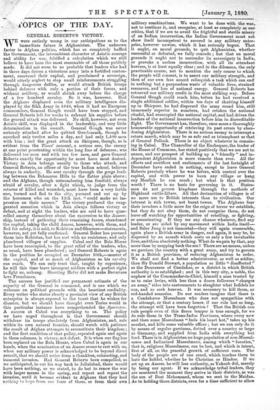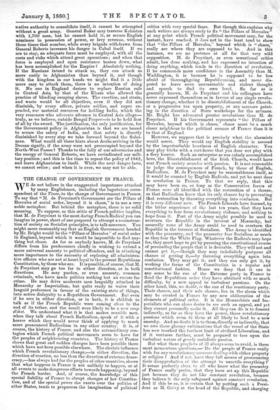OPICS OF THE DAY.
GENERAL ROBERTS'S VICTORY.
WE were entirely wrong in our anticipations as to the immediate future in Afghanistan. The unknown _factor in Afghan politics, which has so completely baffled the Government, the intermittent character of Asiatic courage and ability for war, falsified a calculation which we still believe to have been the most reasonable of all those publicly made. It did not seem to us probable that leaders who had in three days driven a victorious army into a fortified canton- ment, recovered their capital, and proclaimed a sovereign, would utterly neglect to stop small reinforcements straggling through dangerous defiles, or would attack British troops behind defences with only a portion of their forces, and without artillery, or would shrink away before the charge of a few hundred cavalry. So it was, however. Had the Afghans displayed even the military intelligence dis- played by the Sikh Army in 1848, when it had no European commanders, General Gough would have been stopped, and General Roberts left for weeks to exhaust his supplies before the general attack was delivered. No skill, however, not even Asiatic skill, was displayed in the leadership, and very little determination in the assault. General Gough was never seriously attacked after he quitted Gundamuck, though he marched only twelve miles a day, and had only 1,400 men with him ; and the great attack on Shirpore, though, as is evident from the Times' account, a serious one, the enemy at one point penetrating within the long line of defences, was delivered too soon and with too few men, and gave General Roberts exactly the opportunity he must have most desired. Victory in Asia belongs usually to those who attack, and General Roberts, an officer of the true Indian school, believes always in audacity. He sent cavalry through the gorge lead- ing between the Behmaroo Hills to the flatter plain above ; and the Afghans, though outnumbering him fourfold, always afraid of cavalry, after a fight which, to judge from the returns of killed and wounded, must have been a very feeble one, turned and fled to the city, pursued and cut up by the horsemen who on the 13th inst. "could make no im- pression on their masses." The victory produced the exag- gerated sensation which in Asia always follows victory or defeat, and at night the leaders, who are said to have quar- relled among themselves about the succession to the Ameer- ship, instead of gathering their remaining forces, abandoned the capital, taking the child Ameer, however, with them, and fled for safety, it is said, to Kolaistan and Ghuznee—statements, however, not yet fully confirmed. General Baker has pursued them into Kohistan, but has met with no resistance and only plundered villages of supplies. Cabul and the IIA Hissar have been reoccupied, to the great relief of the traders, who, as usual, have been plundered ; and General Roberts is again in the position he occupied on December 10th,—master of the capital, and of so much of Afghanistan as his cavalry can reach. We can only trust that, taught by experience, he will this time leave insurgent soldiers with a perfect right to fight us, unhung. Shooting Hofer did not make Bavarians love Frenchmen.
The success has justified our permanent estimate of the capacity of the General in command, and is one which we -welcome on political grounds with the heartiest cordiality. Every writer who states clearly a pessimist view of any British enterprise is always exposed to the taunt that he wishes for disaster, but we should have thought even Tories would in this particular instance have comprehended the Spectator. A success at Cabul was everything to us. The policy we have urged throughout is that Government should withdraw its troops absolutely from Afghanistan, and, safe within its own natural frontier, should watch with patience the result of Afghan attempts to reconstitute their kingdom ; and the first condition of that policy, repeated again and again in these columns, is victory, not defeat. It is when our flag has been replaced on the Bala Hissar, when Cabul is again in our hands, when the nomination of an Ameer seems to rest with us, when our military power is acknowledged to be beyond direct assault, that we should retire from a thankless, exhausting, and immoral invasion. Had General Roberts been compelled; as we anticipated, to cut his way back to Jellalabad, there would have been nothing, as we stated, to do but to renew the war with larger means in the spring, and repeat and repeat the invasion, until it became evident to Afghans that they had nothing to hope from our fears of them; or from their own military combinations. We want to be done with the war, not to continue it, and recognise, at least as completely as our critics, that if we are to avoid the frightful and sterile misery of an Indian insurrection, the Indian Government must not. show itself incompetent to succeed in any military enter- prise, however unwise, which it has seriously begun. That it ought, on moral grounds, to quit Afghanistan, whether successful or defeated, we fully concede,; but that on moral grounds it ought not to surrender its sovereignty in India, or provoke a useless insurrection, with all its attendant horrors, is at least equally clear ; and in the dilemma, the only practicable course, not to mention the only course to which the people will consent, is to assert our military strength, and then of our own free accord relinquish a task which can end' in nothing but a purposeless waste of valuable lives, strained' resources, and loss of national energy. General Roberts has retrieved our military credit in the most striking way. Before- General Gough could reach him, before he had received a single additional soldier, within ten days of shutting himself up in Shirpore, he had dispersed the army round him, still', immensely superior in numbers, had retaken the national citadel, had reoccupied the national capital, and had driven the leaders of the national insurrection before him in discreditable flight. The Government has, therefore, once more a thoroughly honourable opportunity of retrieving its past errors by aban- doning Afghanistan. There is no serious enemy to interrupt a return march, which may be as safe and as triumphant as that of General Pollock. There is no object whatever in remain- ing in Cabul. The Chancellor of the Exchequer, the leader of the House of Commons, has stated positively that we are not to annex, and our prospect of building up a " friendly " and in- dependent Afghanistan is more remote than ever. All the- efforts and sacrifices and excitements of the last fortnight of December have ended in nothing, except to leave General Roberts precisely where he was before, with control over the capital, and with power to burn any village or hang any Moollah he can reach ; but what is that position worth ? There is no basis for governing in it. States- men do not govern kingdoms through the methods of Highland cattle-lifters. All that destruction of villages is of no more use to British interests than to civilisation. Our- interest is rich towns, not burnt towns. The Afghans fear- their invaders a little more for the reign of terror we establish,. but they do not obey them, do not recognise them, do not leave off watching for opportunities of rebelling, or fighting, or assassinating. If they see any chance whatever, find any' leader, or are aided by any movement within India itself— and Salar Jung is not immortal—they will again reassemble,. again place a British army in danger, and again, it may be, be- dispersed by an assault which costs us only a few invaluable lives, and them absolutely nothing. What do wegain by that, any- more than by mopping back the sea? There are no means, unless- we garrison the country with a great army, and try to govern it as a British province, of reducing Afghanistan to order._ We shall not find a better administrator, as well as soldier, than Sir Donald Stewart, a population so little "disaffected" as the Douranees of Candahar, or a district in which British authority is so established; and in this very city, a noble, the' nephew of the Commander-in-Chief, himself a man trusted by us to raise levies, with less than a dozen followers "charges. an army," rides into cantonments to slaughter what Infidels he can, and so seek heaven. It was necessary to kill them, as red-handed assassins. Do our readers imagine that there is a Candaharee Mussulman who does not sympathise with the attempt, or that a century hence, if our rule last so long, the attempt will have been forgotten ? That the British can rule people even of this fierce temper is true enough, for we do rule them in the Trans-Indus Provinces, where every now and then some Mussulman "feels his heart hot," takes up his. musket, and kills some valuable officer ; but we can only do it by means of regular garrisons, dotted over a country as large as Germany, and supplied from India with everything but. food. There is in Afghanistan no huge population of non-Mussul- mans and Indianised Mussulmans, among which "fanatics," that is, religious Mussulmans, can be lost, and which is intent, first of all, on the peaceful growth of sufficient corn. The body of the people are of one creed, which teaches them to hate the Infidel, whether he be Christian or Hindoo. If we set up an Ameer, he will lose authority, as Yakoob did, merely by being our agent: If we acknowledge tribal leaders, they are murdered the moment they arrive in their districts, as was the son of Dost Mahommed, whom we sent to the Maidan. As to holding those districts, even for a time sufficient to allow native authority to consolidate itself, it cannot be attempted without a great army. General Baker may traverse Kohistan with 1,700 men, but he cannot hold it, or secure English nominees in possession of power, or levy revenue, without three times that number, while every brigade withdrawn from General Roberts increases his danger in Cabul itself. If we are to stay, an adequate force must be employed, with all the costs and risks which attend great operations ; and when that force is employed and open resistance beaten down, what has been accomplished for the Empire? Absolutely nothing. If the Russians intend to attack us, they can attack us more easily in Afghanistan than beyond it, and though with the kingdom in our hands we might find it a little more easy to attack them, there is no intention of doing it. No one in England desires to replace Russian rule in Central Asie, by that of the Khans who allowed the practice of blinding escaping slaves. The exertion, and strain, and waste would be all objectless, even if they did not diminish,' by every officer, private soldier, and rupee ex- pended, our material resources for holding India, which the very reasoners who advocate advance in Central Asia allege— truly, as we believe, outside Bengal Proper—is to be held first of all by the sword. The justification, the only justification, for the Government policy in Afghanistan is that we are bound to secure the safety of India, and that safety is directly diminished by every step we take forward beyond the Sulei- man. What would all these hints about Arabs arriving in the Deccan signify, if the army were not preoccupied beyond the North-West Passes Thanks to the folly of our adversaries and the energy of General Roberts, we have revindicated our mili- tary position ; and this is the time to repeat the policy of 1842, and leave Afghanistan to itself. While the next danger lasts, we cannot retire ; and when it is over, we may not be able.











































 Previous page
Previous page